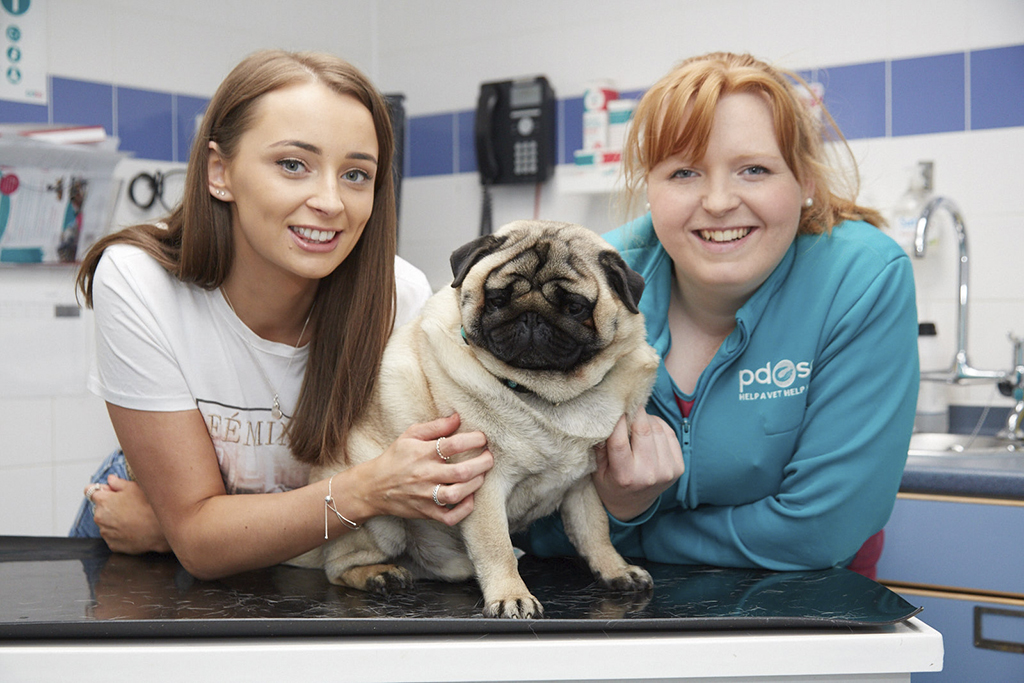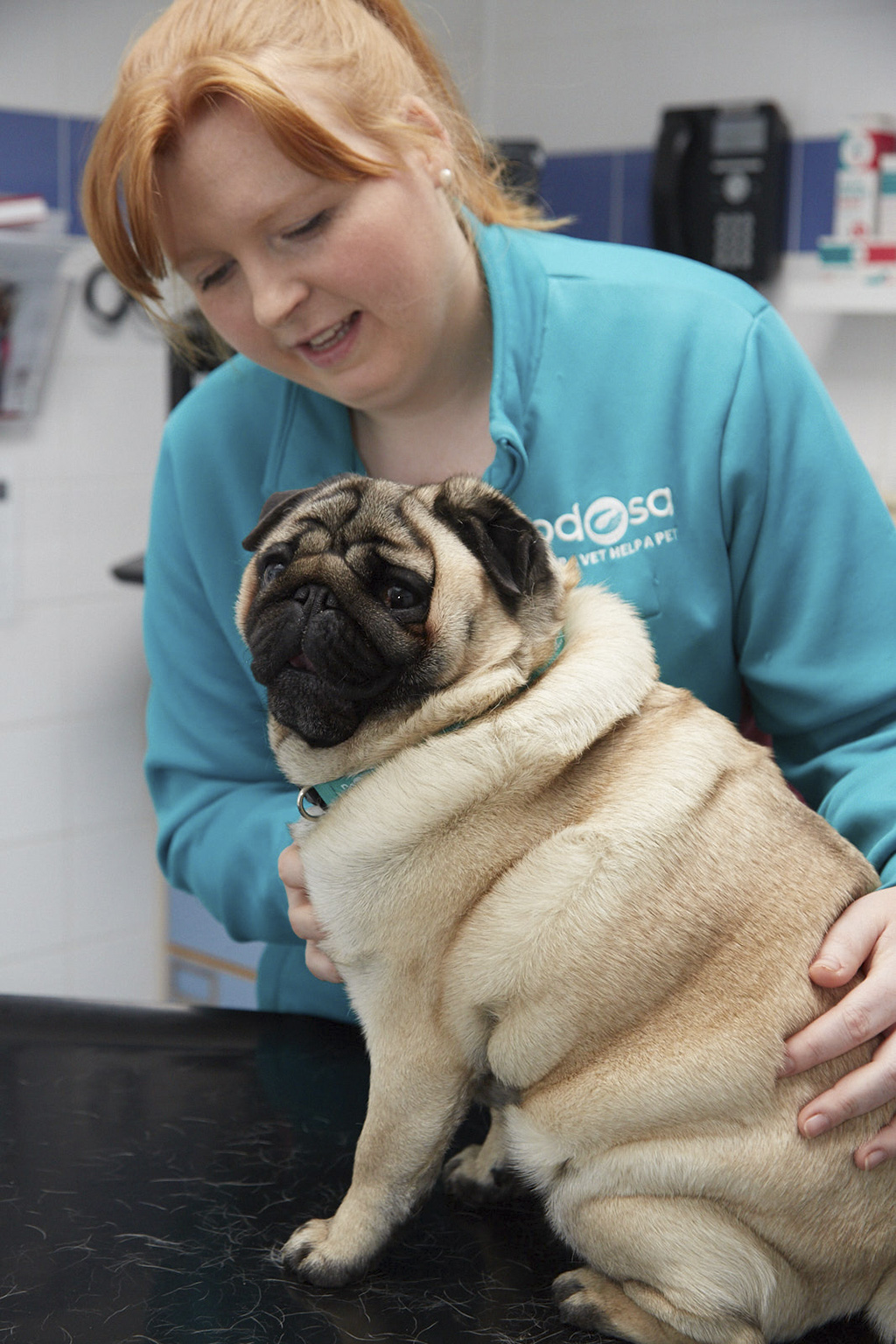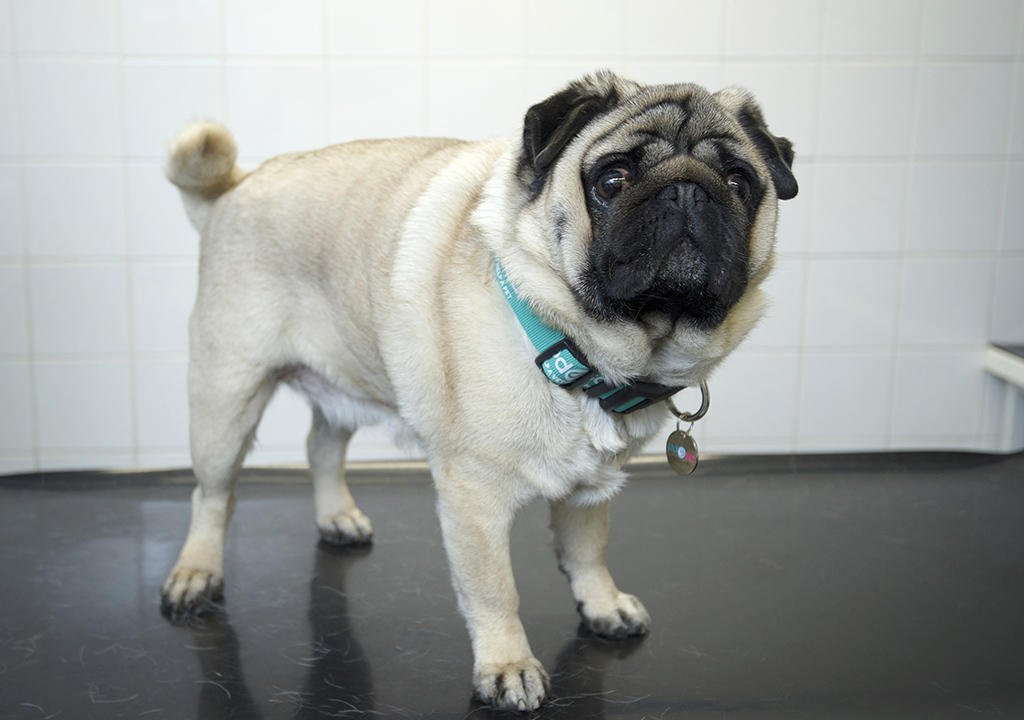
From podgy pug to pet slimmer runner-up
A former roly-poly pooch from Glasgow, who had an unhealthy love affair with leftovers, has been named runner-up the UK’s largest pet slimming competition.
In the PDSA Pet Fit Club, he shed 18% of his bodyweight and seven inches off his waist in just six months.
The once-obese Pug, Percy, weighed-in at a whopping 12.62kgs (2st) – 40% over his ideal weight of 9kg (1st 6lb).
After PDSA vets warned that his health was at serious risk from his excess inches, his concerned owners began pounding the streets with him and cutting back on the excess food.
He’s now lost over seven inches from his waist and 4.5 inches from his chest, wowing Pet Fit Club judges with his trimmer and healthier 10.3kg (1st 9lb) figure – although he still has a few pounds to shed.
Every year vet charity PDSA helps the UK’s fattest pets battle the bulge in Pet Fit Club – a six-month diet and exercise challenge, specially tailored and overseen by its vets and nurses.

Percy the Pug and his owner Chloe Morrison, at the PDSA in Glasgow, before his weight loss journey began
Pampered Percy used to be spoiled rotten, using his puppy-dog eyes to convince his owner to give him his favourite treats like roast chicken. It was this love of leftovers from the dinner table that led to his balloon in size. But it was the worry caused by him being constantly out of breath on walks, and the comments on his huge size from people in the street, which prompted owner Chloe Morrison, to take action.
Chloe, from Ballieston, Glasgow, was especially concerned the excess pounds were exacerbating Percy’s breathing problems arising from his flat face.
However, six months on a strict diet and exercise programme has changed his life, and Percy has already lost an impressive 2.32kg (5lb) thanks to PDSA Pet Fit Club.
Chloe said: ‘I’m over the moon with the results so far, and my friends and family can’t believe how much thinner he is now. I used to get comments from people in the street about him being the biggest Pug they’d ever seen, which thankfully, I don’t get anymore!

Percy the Pug was a big boy
‘He can run around much easier now and he has more stamina on walks. Before he would refuse to go any further on walks, but he’s able to go much longer now. He doesn’t get as breathless as before, and with continued weight loss we hope for this to improve even more.
‘We’ve stuck to the diet and he no longer gets leftovers from the dinner table. We’re very careful not to overfeed him so we weigh out his food, and if we want to give him a treat we take it out of his allowance for that day. ‘
Despite his progress, Percy still has more weight to lose to reach his ideal weight 9kg (1st 6lb).
‘I’m so pleased to that Percy’s much healthier and more mobile now,’ continued Chloe. ‘We still have some more work to do to get him down to his ideal weight, but I’m so pleased with where we’ve got.
‘Pet Fit Club has been the best start to his weight loss journey and we’re going to continue with the diet until he reaches his target weight. I’m excited to keep going with it now I’ve got the advice I need from PDSA vets.’
Percy’s weight-loss has been supervised by Amanda Stewart, vet nurse at the Glasgow Shamrock Street PDSA Pet Hospital.

Percy the pug has been on PDSAÕs Pet Fit Club (Photo: Sandy Young)
Amanda said: ‘Percy is on the way to becoming much happier and healthier. He is a lot slimmer than the morbidly obese pooch that came in for his very first Pet Fit Club weigh-in six months ago. Every month we’ve seen the small changes in him as he’s lost more weight.
‘His family have been very dedicated, overhauling his diet and exercise programme to transform his life!
‘Any owners who are worried about their pet’s weight should seek advice from their vet, who can work with them to get them on the right diet and safely increase their pet’s exercise levels.”
PDSA Vet Nurse Nina Downing, who is on the Pet Fit Club judging panel, added: ‘It has been hugely rewarding to see Percy and the other pets’ weight decrease over the last six months. Their success is testament to the hard work of their owners and our PDSA veterinary teams.
‘Pet obesity is a growing issue that affects millions of UK pets. We believe up to 50% of dogs and cats in the UK are overweight or obese, which can lead to serious long term health problems and a shortened life expectancy.’
TAGS

